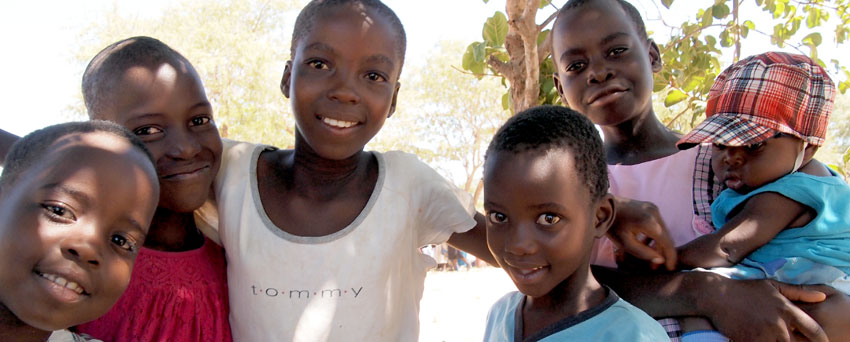
The Zienzele Foundation: Achieving self-reliance and a better life for Zimbabwean orphans and caregivers
|

In the case of adult caregivers, this primarily means helping them to organize projects through which they earn money or produce food – traditional basket-making, sewing, and gardening, for example. Other project ideas are underway or under consideration.
For orphans, achieving self-reliance means education above all. For a Zimbabwean child living in poverty in a rural area, even a good education is not a guaranteed path to a better life – but it is the best path by far. Unfortunately, even primary school students must pay fees in Zimbabwe. The fees seem incredibly low to Americans, but for many families in rural Zimbabwe, paying school fees is daunting; for orphans, paying fees is simply impossible without help. In recent years, the Zienzele Foundation has placed increasing emphasis on Child-Headed Households. AIDS has decimated an entire generation of Zimbabweans. Hundred of thousands of children have been orphaned. Most of them are taken in by relatives or neighbors, especially by grandparents. These are the caregivers with whom Zienzele works. Unfortunately, many of the caregivers are getting older or getting sick, either dying or becoming infirm. This creates an increasingly grave situation in which children are left on their own to look after younger siblings, sometimes to care for the grandparents who used to be their caregivers.
SURPRISES To those who know the Zienzele Foundation, none of the above comes as a surprise. However, there were things about our visit that were surprising to us, and we want to share them. First and foremost, we were surprised by Prisca Nemapare! We'd only met Prisca in the U.S., mostly at Zienzele celebrations where she has been a speaker. Prisca always impressed us as very smart, dedicated, and kind, all of which she is. But how could we have known about her wicked and rather quirky sense of humor?
Another surprise: The rural area south of Masvingo where Zienzele works is more beautiful than we imagined. Below is our favorite photo. As in the old Transkei in South Africa, poverty can exist in a gorgeous setting. We often thought that if only people could eat scenery, they would be well-fed indeed. (In truth, few of the views in the area are as striking as this one.) 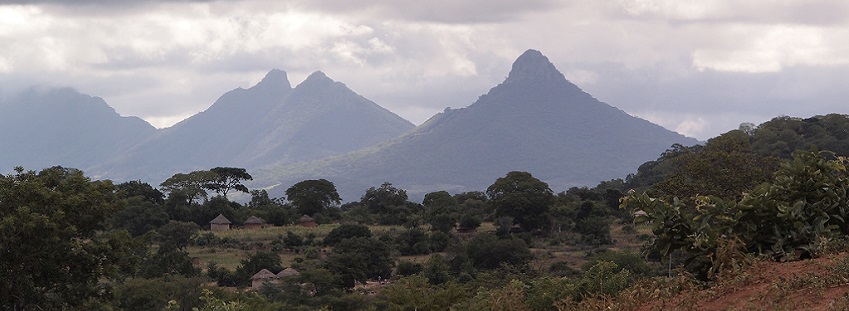 In Berejena district, south of Masvingo
Third, we had heard about devastating rains and flooding in Harare, Zimbabwe's capital city, so we were taken completely by surprise to hear and see that there is a terrible drought in southern Zimbabwe, where Zienzele works. One man, a husband and  father,
told Wally quite calmly that some children in his village would die
this year. Unfortunately, there is nothing new in this. father,
told Wally quite calmly that some children in his village would die
this year. Unfortunately, there is nothing new in this.Photo left: Notice the sickly grass, or lack of it. When this photo was taken in February, the next rains could not be expected for eight months. When the grass is gone and the streams run dry, what will cattle eat or drink? What will people eat or drink? Fourth, and somewhat paradoxically, Zimbabwe is not in quite the terrible shape that we expected. Certainly just a few years ago the economy was in free fall, agricultural production was devastated by farm invasions, infrastructure was crumbling, and some people were starving. All these things are still true to some degree, especially in rural areas, but we were surprised to see signs of a rebound. Store shelves were packed in all the cities and towns we visited, and the stores and streets were full of Africans who evidently have the money to shop. There was lots of traffic, and in Masvingo and Mutare there were even traffic jams. (Partly because of Zimbabwe's government, the relative prosperity of some regions is not shared with people who suffer from drought -- like those with whom Zienzele works.)
Wally was particularly amazed to witness the degree of press freedom that still exists in Zimbabwe, despite notorious efforts to intimidate reporters. There are newspapers sold on every street corner that are full of harsh criticism of the government. Clearly, the U.S. media do not give us an accurate picture of life in Zimbabwe, or anywhere else, in our opinion. For one thing, media almost never report good news. A drought, a genocide – these stories from Africa can make headlines. But what about a strong uptick in the economy of an African country? Or a new business venture that's doing well? A new school or university that is achieving remarkable success? Don't expect to read about it here in the U.S. or see it on television. Even more important, media don't give a sense of the spirit of the people. If things are better in Zimbabwe than we expected, it is because so many people in Zimbabwe are hard-working, resilient, and optimistic in the face of appalling difficulties. 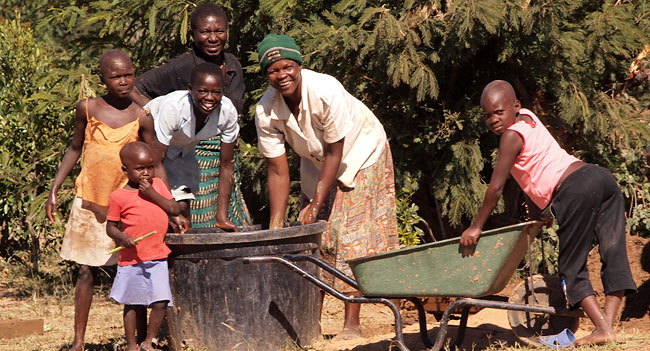 Hardworking, resilient, and optimistic ... This family is making mud bricks. Working or giving financial support in a country where conditions are completely hopeless feels like pouring effort and money down a bottomless pit of misery. That is certainly not the case in Zimbabwe. 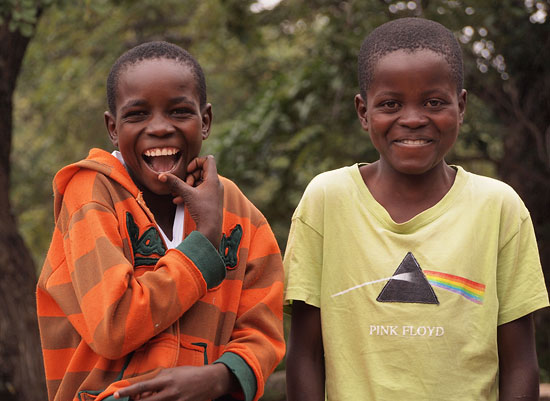 These Zienzele orphans are optimistic, despite the challenges they face. BASKET PROJECTS Zienzele's baskets are trademarks of the organization, for good reason. Basket-making is a way to achieve both goals mentioned above: enabling caregivers to earn money, and keeping orphans in school. Zienzele basket-making groups are organized by school district. Women, most of whom are caring for orphans themselves, make traditional baskets. Prisca and Nancy buy the baskets for cash when they visit on field trips. One school principal told Wally that the women rely on their basket earnings to purchase corn-meal, cooking oil and other necessities. So even though the amounts of money are small, they are important.
Then the baskets are sold here in the U.S. for considerably higher prices. No problem, it's not capitalism run amok. All the money raised in the U.S.from basket sales is paid directly to schools in Zimbabwe so that orphans can continue to attend  classes. Over 800 orphans are now attending school
as a result. classes. Over 800 orphans are now attending school
as a result.The women in Zienzele basket groups know the importance of education for the children. When asked about goals for the future, several of them said they want to send even more children to school. Asked how they might do it, the first response was "We can make more baskets!" One of the Zienzele Foundation's challenges, therefore, is to find more markets for these beautiful baskets. WORKSHOPS An important part of Zienzele's activities is workshops, both for caregivers and for orphans. Zienzele women's groups are democratic. At the 2013 fall workshops women were asked to decide, among other things, their goals for the next three years. These were some of them:
Repeatedly, women said they need help with water -- not suprising, given the present drought. It's unclear what kind of water projects they can undertake, even with Zienzele's help, given the small-scale, self-help nature of our model. Certainly not giant dams, for example. This does not imply that nothing can or will be done.
An important result of the work women's groups have done together with Zienzele is greater self-confidence and empowerment. Zienzele women's groups met with school officials when fees were improperly raised, and they confronted clinics that were illegally charging for Anti-retroviral medicine needed for treatment of AIDS; their efforts were successful. Women at the workshops were thoughtful and enthusiastic. 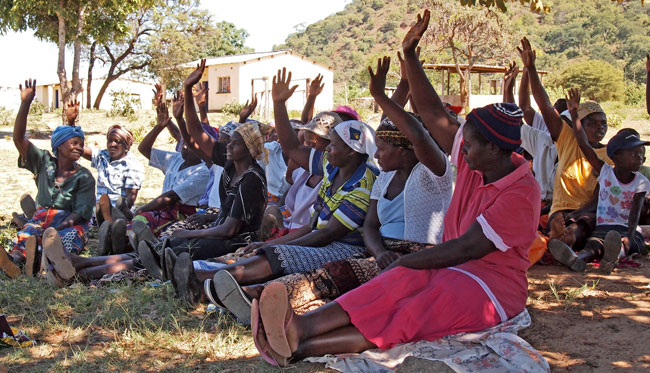 Workshops for children dealt with problems that sometimes arise between them and their caregivers. When parents are missing and caregivers are much older, the generation gap can be wide indeed. Therefore the generation gap was one topic at the children's workshops.
Also, many of the orphans are
HIV-positive, kept healthy by Anti-Retroviral drugs (ARVs) which are
now generally available in Zimbabwe. However, children sometimes face
ridicule at school when they are seen
taking ARVs. This kind of teasing is not only unkind, it can be
deadly; children have died because they were too embarrassed to take
their ARVs regularly. Other topics, therefore, included
resistance to teasing and bullying. After discussions on these topics, children divided into groups and created
skits to illustrate the points they had learned.
On workshop days the children had times for play, sometimes with frisbees, which were entirely new to most of them. The playtime is important because many of the orphans have few opportunities to relax and be children.
There was also time for snacks -- just bread, fruit drink, oranges, and cookies, but all of them a special treat.
CHILD-HEADED HOUSEHOLDS 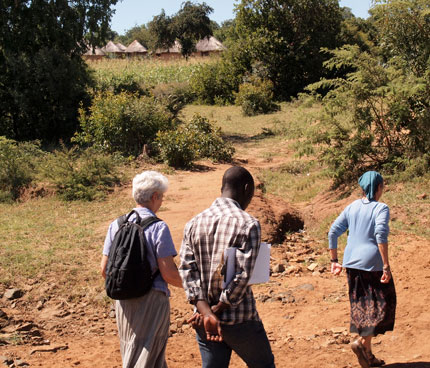 We had an opportunity to visit a few child-headed households. Usually they were well off any road, far from even the rough dirt road on which we drove to the villages. For purposes of the program, Child-Headed Households can be those in which children live either ontheir own, or with grandparents or relatives who are themselves too old or infirm to care for the children effectively. Children in Child Headed Households are visited four times each year. Like other Zienzele orphans, their school fees are paid, but they also receive clothing, and a supply of food staples is delivered on each visit. Right, on our way to a home visit
In the household below, elderly grandparents are caring for two orphans. The grandmother walks long distances every day just to fetch water. The children help as much as they can. Grandfather is frail. Here, as in many other Child-Headed households, parents' graves are only steps away. 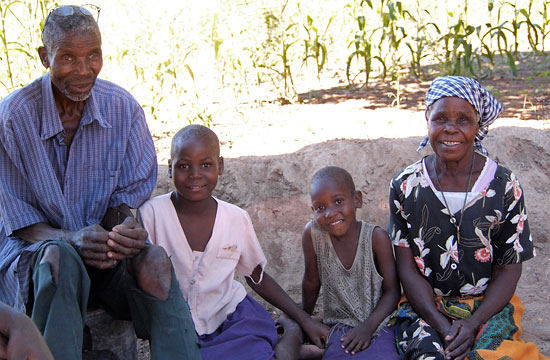 In another household, the mother is still alive, but she will probably die of AIDS because she was too sick before starting ARVs, and Grandma will have to take over. (Mother and Grandma, below left) Grandma cannot do enough for the two children (below right) so Zienzele is taking them on as a Child-Headed Household.
At present it costs $300 per year to sponsor a Child-Headed Household. This provides for school fees, donated clothing, and the deliveries of staple foods. We were somewhat dismayed to realize how modest the food aid is that Zienzele can provide. The food staples that Zienzele delivers four times a year are typically used up in a matter of days. The regular delivery of food is important not because it is a guarantee against hunger, or even against starvation in times of drought. It isn't. The food deliveries are important because they prove to the children that there are people outside Zimbabwe, strangers from half a world away, who know about them, care about them, and want to help them. This brings hope, and hope can make all the difference. 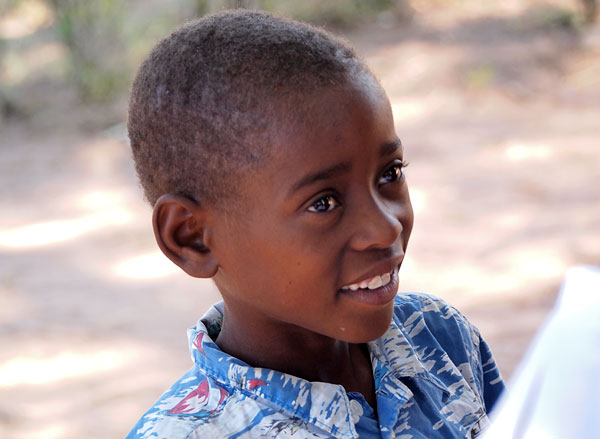 .... hope can make all the difference. |
|||||||||||||||||||||||||||||||||||